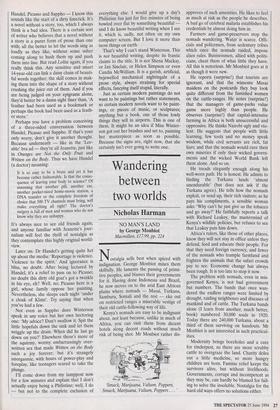Wandering between two worlds
Nicholas Harman
NO MAN'S LAND by George Monbiot Macmillan, £17.99, pp. 224 Nostalgia sells best when spiced with indignation. George Monbiot mixes them skilfully. He laments the passing of primi- tive peoples, and blames their governments for it. Having done Indonesia and Brazil, he now moves on to the arid East African plains where nomads — Masai, Turkana, Samburu, Somali and the rest — eke out on restricted ranges a miserable vestige of their old cattle-following way of life.
Kenya's nomads are easy to be indignant about, not least because, unlike in much of Africa, you can visit them from decent hotels along decent roads without much risk of being shot. Mr Monbiot rather dis- `Smack Marijuana, Valium, Poppers, Smack Marijuana, Valium, Poppers . . . approves of such amenities. He likes to feel as much at risk as the people he describes. A bad go of cerebral malaria establishes his credentials by almost doing him in.
Farmers and game-preservers stop the nomads wandering. Water is scarce. Offi- cials and policemen, from sedentary tribes which once the nomads raided, impose alien rules. Businessmen, allied with politi- cians, cheat them of what little they have. All this is notorious. Mr Monbiot goes at it as though it were new.
He reports (surprise!) that tourists are ignorant, and that the winsome Masai maidens on the postcards they buy look quite different from the famished women on the cattle-ranges. He notes (surprise!) that the managers of game-parks value game more highly than people. He observes (surprise!) that capital-intensive farming in Africa is both unsuccessful and oppressive. He thinks Nairobi ugly and vio- lent. He suggests that people with little learning, few tools and no money speak wisdom, while civil servants are rich, fat liars; and that the nomads would cure their own miseries if only their wicked govern- ments and the wicked World Bank left them alone. And so on.
He treads elegantly enough along his well-worn path. He is honest. He admits to finding the Turkana lands 'almost unendurable' (but does not ask if the Turkana agree). He tells how the nomads exploit, or send up, their rich visitors; as he pays his compliments, a sensible woman asks: 'Why can't he just give us the tobacco and go away?' He faithfully reports a talk with Richard Leakey, the mastermind of Kenya's wildlife policies, but refuses to see that Leakey puts him down.
Africa's rulers, like those of other places, know they will not stay in office unless they defend, feed and educate their people. For that they need foreign currency, and fewer of the nomads who trample farmland and frighten the animals that the safari crowds pay to see. Economic change has always been rough. It is too late to stop it now.
The problem with nomads, even in mis- governed Kenya, is not bad government but numbers. The bands that once wan- dered the endless ranges were limited by drought, raiding neighbours and diseases of mankind and of cattle. The Turkana bands alone (I learn from another, much better, book) numbered 30,000 souls in 1920. Today there are 240,000 Turkana, about a third of them surviving on handouts. Mr Monbiot is not interested in such practical- ities.
Modernity brings boreholes and a cure for rinderpest, so there are more scrubby cattle to overgraze the land. Charity doles out a little medicine, so more hungry children are born. Famine relief keeps the survivors alive, but without livelihoods. Governments, corrupt and incompetent as they may be, can hardly be blamed for fail- ing to solve the insoluble. Nostalgia for the hard old ways offers no solutions either.
































































 Previous page
Previous page